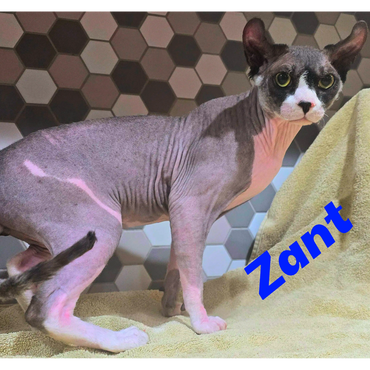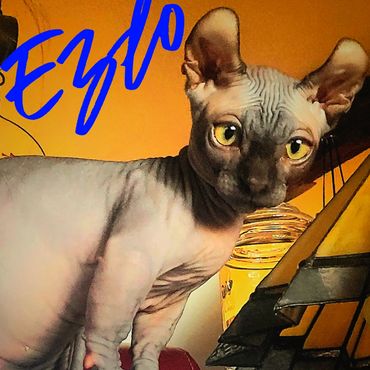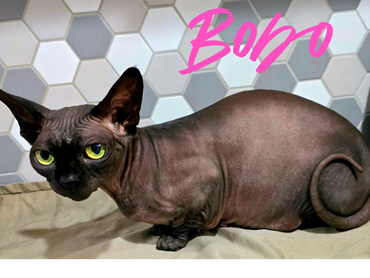
About Them...
The Sphynx cat, or simply the Sphynx, is a breed of cat well known for its lack of fur. Hairlessness in cats is a naturally occurring genetic mutation, and the Sphynx was developed through the selective breeding of these animals, starting in the 1960s in Canada.
According to breed standards, the skin should have the texture of chamois leather, as they can have fine hairs, however, they can also be completely hairless. Whiskers may be present, either whole or broken, or may be totally absent. They have a narrow, long head and webbed feet. Their skin is the color that their fur would be, and all the usual cat markings may be found on the Sphynx's; solid, point, van, tabby, calico and so forth.
Cattitude
Sphynx are known for their extroverted behavior. They display a high level of energy, intelligence, curiosity and affection for their owners. They are one of the more dog-like breeds, greeting their owners at the door and are usually friendly when meeting strangers. Sphynx lose body heat more readily than coated cats, making them very warm to the touch, this also makes them prone to seeking out warm places to lounge.
Our Kings



Our Queens






Our Adult Cat's Health
1. Sphynx DNA HCM Screen
DNA test results will indicate if the cat has the mutation on 1 copy of its 2 gene copies (called heterozygous) or both gene copies (homozygous). At this time, we do not know if the risk of developing disease is higher in cats that are homozygous for the mutation than heterozygous.
Sphynx hypertrophic cardiomyopathy (HCM) usually does not show up until they are an adult although the genetic mutation is present at birth. The age of presentation of disease is variable with many cats developing the disease between 2-3 years of age and some developing it much older (8 -10 years of age).
A DNA mutation in about 60% of affected Sphynx Cats. This mutation is also found occasionally in healthy adult Sphynx cats who do not have the disease. This referred to as “incomplete penetrance”. This means that even if a cat has the genetic mutation, the mutation may not actually penetrate or lead to the development in full disease in that cat.
2. FeLV & FIV Test
Feline leukemia virus is mainly spread through saliva when cats groom each other, and when food and water bowls are shared. In North America, about 4% of tested cats are found to be infected with FeLV.
Feline immunodeficiency virus is found less often in kittens and neutered adult cats. The virus is spread through the saliva and is usually passed to other cats by bite wounds or grooming behaviors. In North America, about 3 to 5% of tested cats are found to be infected with FIV.
Vaccines
1. Tru-Fel-Ultra FeLv Vaccine
Feline Leukemia Virus (FeLV): The leading cause of virus-associated deaths in cats, FeLV spreads through the saliva, nasal secretions, feces, urine, and milk of infected cats. Casual contact, bite wounds, and nursing can all transmit the infection.
2. Tru-Fel-Ultra FVRCP Vaccine
preventative measure to provide advanced protection from:
- Rhinotracheitis (FVR): FVR, also known as feline herpesvirus, infects cats of all ages, whether domesticated or wild. It causes upper respiratory disease and tissue inflammation around your cat's eyes. There is no cure for FVR, and cats are treated symptomatically.
- Calicivirus (FVC): FVC is a highly contagious feline disease, causing mild to severe oral and respiratory infections. The virus typically starts at the back of your cat's mouth and replicates, spreading through the bloodstream to the organs.
- Panleukopenia (FP): FP is a contagious and dangerous viral disease caused by the feline parvovirus, severely affecting kittens. FP invades, attacks and kills your cat's cells.
3. IMRAB TF 3 Rabies Vaccine
For the vaccination of healthy cats, dogs, and ferrets 12 weeks of age and older for prevention of disease due to rabies virus
- Contains the same virus strain that is used in the pasteur merieux connaught human vaccine
- Killed virus
- Cats and dogs, 1 year after first vaccination, then every 3 years
- Does not contain thimerosal
The Cattery Inside & Out
What your new kitten will go home with
Vaccine Record & Vet Exam
Vaccine Record & Vet Exam
Vaccine Record & Vet Exam
Your Kitten will have their first FVRCP intranasal vaccine at 8 weeks old, along with a vet exam and deworming. The record of this will be in your packet at pick up.
Microchip Information
Vaccine Record & Vet Exam
Vaccine Record & Vet Exam
Your Kitten has already been Microchipped!
The number and instructions on how to register it in your name will go home with you,
DONT FORGET TO REGISTER IT!
Food & Supplement samples
Males are Neutered, Females will have a $200 return AFTER spay*
Males are Neutered, Females will have a $200 return AFTER spay*
Your Kitten will come with a small amount of the diamond naturals kitten food and NuPro nuggets to get you going, even if you do not plan to keep them on it, which is fine! Make sure to use this to transition your kitten to whatever you choose.
Males are Neutered, Females will have a $200 return AFTER spay*
Males are Neutered, Females will have a $200 return AFTER spay*
Males are Neutered, Females will have a $200 return AFTER spay*
Your male kitten is neutered at 8-9 weeks old.
Females are sent home on a spay contract, once they are big enough to be spayed (over 3lbs) and you send us the vet record for proof of procedure, we will send you a refund of $200.
* This is to be done BEFORE the cat is 6 months old or the contract is null and void!